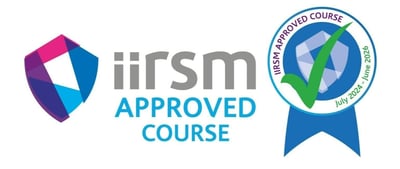
Operational Risk
Our Operational Risk Course will help your employees understand companies' common operational risks, including legal and compliance risk, third-party risk and cyber risk.
It shows learners how operational risk can be conceptualised in terms of cause, consequences and risk events.
The course also covers tools and techniques to identify and analyse risk, as well as the various ways risks can be managed by implementing risk controls.
- 50 Minutes
- For all staff
- Based on best-practice risk management frameworks and suitable for global audiences.

Learning objectives
- Understand and identify the common operational risks that we face as a Company
- Implement appropriate controls to ensure effective risk management
- Identify the benefits and drawbacks of modelling risk
- Take appropriate action to manage operational risks in their day-to-day role
What can you expect your employees to learn?
Welcome
- Learning objectives
- How to complete this course
What is operational risk?
- In the news
- You decide: What type of operational risk is it?
Identifying operational risks
- You decide: Is it an operational risk or not?
- You decide: Whose approach to operational risk?
Understanding cause & effect
Collecting data on operational risks
- Assessing operational risk
- Probability (likelihood)
- Impact (severity)
- You decide: What are the chances of that?
- You decide: What impact would that have on us?
- Calculating the overall score
Methods of measuring operational risk
- Risk maps
Operational risk controls
- The 4Ts Model
- You decide: Controlling operational risks
Monitoring & reporting
- Risk reporting
- Stress testing & scenario analysis
- What are the benefits of scenario analysis?
- Our risk governance framework
The 3LoD model
Best practice for managing operational risk
Scenarios: A done deal
- Scenario 1: Assessing the risks
- Scenario 2: Controlling the risks
- Scenario 3: Better governance
Scenarios: The data breach
- Scenario 1: Assessing the risks
- Scenario 2: Controlling the risks
- Scenario 3: Better governance
Summary
Affirmation
Assessment
Start your compliance e-learning journey with a free trial
Our no-obligation free trial gives you access to our libraries and compliance platform.
Ready to start your free trial? Complete the form, and a member of the Skillcast team will be in touch with further details.
Your questions, answered
DORA
CyberFocus
Common FAQs
How can I benchmark my team's cyber security awareness?
Are Skillcast courses SCORM-compliant?
What other tools are needed beyond training?
Is our training content still compliant with the latest legislation?
- You can check the latest course content updates in our library updates page: https://www.skillcast.com/compliance-course-library-updates
- For major legislative changes, we:
- Send you email alerts to ensure you are notified
- Offer you a free trial of newly created or updated content
- Host webinars with compliance experts to explain the changes and how our training supports your ongoing compliance
Can you translate our content into other languages?
What file types are supported by the Skillcast system?
Features |
Supported file types and details |
|
File Exchange |
File types: PDF, Excel spreadsheets, Word documents, SCORM and xAPI files, and compressed zip files. Max file size: Default is 1GB, can be increased to a max of 2GB |
|
SCORM files |
Versions: SCORM 1.2, SCORM 1.2 for Moodle, SCORM 2004 2nd, 3rd and 4th Edition. Max file size: 1024MB |
|
xAPI file |
Max file size: 2GB |
|
Videos |
File types: MP4 or MOV. Videos must be optimised, with a max file size of 100MB. If the file is bigger, our Design Team can help |
|
Images |
File types: jpg, png and gif. The file size should ideally be 100KB, but it can be up to 250KB |
|
CPD evidence |
File types: Word, PDF, Excel and CSV. File size: the limit should be whatever the portal config option is set to. Servers are set to max 2GB |
|
Policy documents |
PDF or Word File size: the limit should be whatever the portal config option is set to. Servers are set to max 2GB |
|
Offline activities evidence |
File types: PDF, DOC, DOCX, XLS, XLSX, CSV, PNG, GIF, JPEG, JPG, PPTX and MSG. File size: the limit should be whatever the portal config option is set to. Servers are set to max 2GB |
|
Client logo files |
File types provided by client: EPS, PDF, AI and SVG |
|
Registers |
PDF, DOC, DOCX, XLS, XLSX, CSV, PPT, PPTX, POT, PPA, PPS, JPG, JPEG, PJEPG, PNG, BMP, GIF, MP4, MOV, WMV, CPTX, CP, TXT, ZIP and MSG files |
|
Declarations |
JPG, JPEG, PNG, GIF, XLS and XLSX files |
Related courses
Boost your compliance efforts with our range of courses. Varying in length and topic, our courses equip you with the tools to create an ethical and resilient workplace.
Phishing
It's essential for your employees to know what phishing is, how to spot the signs of an attempt and how to protect themselves and your Company.
Information Security
The loss or theft of commercially sensitive information may damage revenues, reputation and consumer trust.
Spot a Phishing Attempt
Phishing emails are fraudulent attempts by cybercriminals to trick individuals into revealing sensitive information.
Business Email Compromise
Business Email Compromise (BEC) is a targeted cyberattack where criminals impersonate executives or hack accounts to steal money or sensitive information.
Records Management
Records management refers to employees' creation, storage, archiving, and disposal of business records.
Deepfake Awareness
Deepfakes use artificial intelligence to create fake images, audio or videos that can deceive individuals and organisations.
Understanding Information Security
Information security is essential to protect sensitive business and customer data from unauthorised access, breaches and cyber threats.
Common Cyber Threats
Cyber threats such as phishing, malware, ransomware and unsecured networks pose significant risks to businesses.
Zero Trust Cybersecurity
The zero trust cybersecurity model ensures IT systems remain inaccessible by default, requiring strict verification before granting access.
Bring Your Own Device Security
Bring Your Own Device (BYOD) policies offer convenience and flexibility but also introduce cybersecurity risks.
Device Hygiene
Device hygiene is the practice of keeping digital devices secure and free from cyber threats to protect company data and networks.
Malware
Malware is malicious software designed to harm or exploit computer systems, ranging from viruses and ransomware to spyware and botnets.
Ransomware
Ransomware is a type of malware that encrypts files and demands payment for their release, often causing severe financial and operational damage.
Smishing
Smishing is a targeted phishing scam that uses deceptive text messages to gain sensitive information.
Spear Phishing
Spear phishing targets specific individuals with convincing emails designed to deceive them.
Video Conferencing
Video conferencing is a vital business tool, but it also presents security and privacy risks if not used correctly.
Vishing
Vishing is a social engineering attack where cybercriminals use phone calls to trick individuals into revealing sensitive information.
Creating Strong Passwords
Strong password protection is essential to safeguarding company systems from cyber threats such as brute force attacks and password guessing.
Multi-factor Authentication
Multi-factor authentication (MFA) enhances security by requiring users to verify their identity through multiple authentication methods.
Reacting to Password Breaches
Password breaches can lead to unauthorised access, fraud and data theft, often resulting from weak passwords, phishing or insecure networks.
Information Classification
This training helps employees understand different levels of information classification, their restrictions and how to handle data securely.
Information Security on the Move
Handling company information securely, especially when working remotely or traveling, is essential to prevent data breaches and security risks.
Tailgating and Piggybacking
Cybersecurity is not just about digital protection but also involves securing physical access to critical systems.
Secure Web Browsing
Practicing safe web browsing helps to reduce security risks and protect sensitive information.
Supply Chain Cybersecurity
A company’s cybersecurity is only as strong as its weakest link and supply chain vulnerabilities can expose businesses to major breaches.
Transferring Information Securely
Securely transferring information is essential to protect sensitive data from breaches, legal risks and business disruptions.
Using Wi-Fi safely
Wi-Fi connectivity offers convenience but also exposes devices and data to security risks if not properly managed.
Advising Customers on Cybersecurity
Cybersecurity is everyone's responsibility, including guiding customers to protect themselves from online threats.
CEO Fraud
CEO fraud is a type of Business Email Compromise where cybercriminals impersonate executives to trick employees into making payments or sharing confidential information.
Guide to Secure Remote Working
Remote work provides flexibility but also introduces cybersecurity risks that can compromise company data and systems.
Think Before You Click
Clicking on malicious links or attachments is one of the most common ways cybercriminals infect IT systems with malware.
Cybersecurity
Educate your staff on how to recognise cyber security risks, where they are likely to originate, how to combat them, and the support systems your Company has in place in the event of a cyber security incident.
Digital Operational Resilience Act (DORA)
Although you may feel that you treat people equally, sometimes your actions might be perceived differently by others, and lead them to feel uncomfortable or discriminated against.


